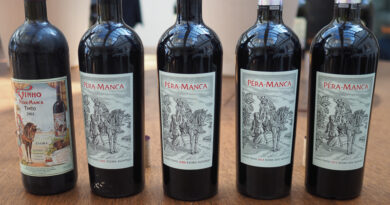Modest success is the enemy of true success
I haven’t done much consulting in the world of wine, but I have done a bit. I once went to a winery in Portugal to spend a day with the team, see what they were doing, and make some suggestions as to how to proceed. Someone had just purchased the winery, and
It’s often useful to get an outsider’s view on what you are doing, if you are a winery. Especially if that person has broad international perspective. But from my position, I’m quite cautious when I offer feedback because I don’t have skin in the game, and it’s not my money that’s at stake.
On that visit, I found a winery that had a famous wine, made from an international grape variety, that did well on the domestic market. But this wasn’t a local variety, and the climate wasn’t well suited to it. The style of wine that was being made from this grape (a white one) was somewhat old fashioned in style, and had zero potential for export.
My view? That this was not a good place to start from, and fine-tuning wasn’t going to work. For the future success of this winery, a fresh start was needed, a change in emphasis and branding, and a better matching of grape varieties to place. This is a long-term view.
In the short-term, the winery was doing fine. It was modestly successful. But moderate success is often this is the enemy of true success. This is because things can continue just as they are. If you are a business that is breaking even, it’s hard to argue for change. If you are sliding into debt, it’s much easier to realise that things must change.
Of course, survival isn’t a bad goal. Sometimes it’s necessary to survive, in order to see out a negative economic cycle, and then continue growth when the storm has passed. But there are many businesses that simply survive, when they could thrive. The vision to see that the current situation is time limited and ultimately not sustainable is a rare gift. Most of the time, people just carry on. Modest success is celebrated as a small victory.
But there is a problem here: for many businesses the current read-out in terms of financials isn’t based on current performance. There’s a time lag. How you fare today often depends on what you were doing three or five years ago. Things can look fine on the spreadsheet now, while the results of current performance will only show up in a few years, and then it’s too late to change. There is a need for strategic thinking that acknowledges this lag.
The other issue is that sometimes people forget to include lost-opportunity cost in their accounting. If you have vineyard land that’s worth €3m then what could you do with that capital if you invested it? Factor in 5% compounding interest, and this is a cost that should be on the spreadsheet, shouldn’t it, if you want to see if your business is truly sustainable financially?
I reckon there are a lot of winery businesses out that that are currently breaking even, but which are – within a certain time – going to begin to slide into debt. The current modest success might be stopping the owners from thinking strategically and making the changes now that could ensure true success in the future. It’s just that if this reappraisal is delayed, then there won’t be the funds available to make the sort of change that is needed.




